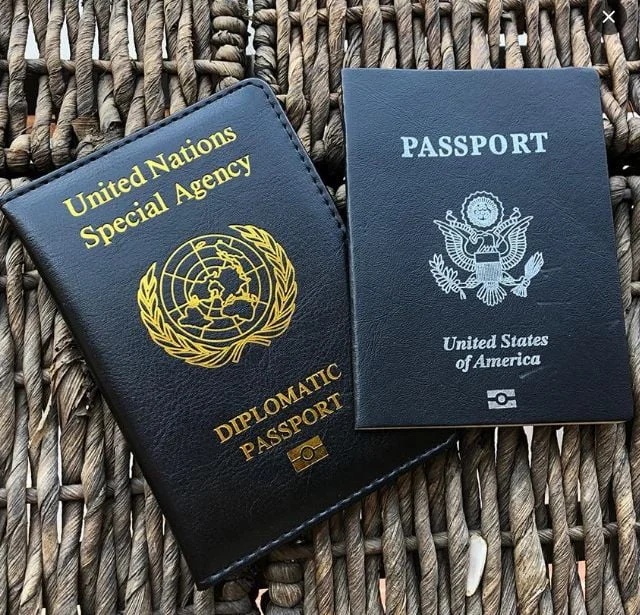INFORMATION
Diplomatic Passport: Your Guide to Elite International Travel & Privileges
In the realm of international travel, not all passports are created equal. Among the most prestigious and powerful travel documents is the diplomatic passport. This specialized document is a symbol of a nation’s representation abroad, granting its holders unique privileges and facilitating the complex world of international relations and diplomacy.
For those curious about this elite form of identification, understanding its purpose, who is eligible, and the benefits it confers is key. This article provides a comprehensive overview of the diplomatic passport, optimized for individuals searching for information on this distinctive travel document.
What is a Diplomatic Passport?
A diplomatic passport is a special type of international identity document issued by a country’s Ministry of Foreign Affairs (or equivalent government body) to its diplomats and other high-ranking government officials. Its primary purpose is to identify the bearer as an official representative of their home country traveling abroad on official duties or state business.
Unlike an ordinary passport, a diplomatic passport is not for personal or tourist travel. It signifies the holder’s official status and is instrumental in the smooth conduct of foreign policy and international negotiations. Diplomatic passports often have a distinct color (e.g., black or deep maroon in some countries) to visually distinguish them.
Who is Eligible for a Diplomatic Passport?
Eligibility for a diplomatic passport is strictly limited and varies by country, but generally includes:
Career Diplomats: Ambassadors, consuls, attachés, and other members of a country’s foreign service who are posted overseas.
High-Ranking Government Officials: Ministers, secretaries, heads of state, members of parliament, and other senior officials traveling for official government business.
Delegates to International Conferences: Individuals formally appointed to represent their government at international congresses, conferences, or negotiations.
Certain Military Personnel: High-ranking military officers on official international assignments.
Immediate Family Members: In many cases, the spouses and dependent children of eligible diplomats and government officials may also be issued diplomatic passports to accompany them on official postings.
The issuance of a diplomatic passport is a matter of state prerogative and is tied directly to the individual’s official role and the nature of their international travel.
Key Benefits and Privileges of Holding a Diplomatic Passport
Possessing a diplomatic passport comes with a range of significant advantages designed to facilitate diplomatic work:
Visa Exemptions and Expedited Processing:
Visa-Free Travel: Holders often enjoy visa exemptions or significantly expedited visa processing for a large number of countries, reducing travel hurdles for official missions.
Priority Clearance: At airports and border crossings, diplomatic passport holders are typically granted priority clearance through special channels, minimizing delays for official travel.
Diplomatic Immunity and Privileges:
While a diplomatic passport itself does not automatically confer diplomatic immunity, it is a key document for individuals who are granted such immunity by a host country under international law (e.g., the Vienna Convention on Diplomatic Relations).
Diplomatic immunity protects diplomats from local jurisdiction (arrest, prosecution, taxation) in the host country, allowing them to perform their duties without hindrance.
Special Privileges: This can include exemption from certain customs duties, special parking permits, and other courtesies extended by host nations.
Enhanced Security and Consular Protection:
Diplomats are often entitled to enhanced security measures.
In non-diplomatic postings, the passport signifies the bearer’s official status, potentially leading to more robust consular assistance from their home country’s embassies or consulates abroad.
Distinction from Ordinary Passports
The differences between a diplomatic passport and a regular (ordinary) passport are substantial:
Feature
Ordinary Passport
Diplomatic Passport
Purpose
Personal travel, tourism, non-official business
Official government business, diplomatic missions
Eligibility
General citizens
High-ranking government officials, accredited diplomats
Color
Typically blue, green, or red (varies by country)
Often black, deep maroon, or distinct color
Validity
Usually 5 or 10 years
Often tied to the duration of the official assignment, typically 5 years or less
Privileges
Standard travel rights, subject to visa rules
Visa exemptions, expedited processing, link to diplomatic immunity
Issuing Authority
Standard passport offices
Ministry of Foreign Affairs or specialized government division
Usage
Personal use only
Strictly for official duties; cannot be used for personal travel
How to Obtain a Diplomatic Passport
The application process for a diplomatic passport is not open to the general public. It is initiated through the relevant government department or foreign ministry for eligible individuals. The process typically involves:
Formal nomination or appointment to a diplomatic or official role.
Submission of specific internal government forms and supporting documentation.
Background checks and security clearances.
Once the official assignment concludes, the diplomatic passport must typically be surrendered to the issuing authority.
Responsibilities of a Diplomatic Passport Holder
Holding a diplomatic passport comes with immense responsibilities. Bearers are expected to uphold the highest standards of conduct, representing their nation with dignity and professionalism. The passport must be used strictly for official duties and in accordance with international protocols and the laws of the host country. Misuse can lead to severe consequences, including the revocation of the passport and diplomatic status.
In conclusion, the diplomatic passport is a powerful and specialized document, essential for facilitating international relations and empowering a nation’s representatives on the global stage. Its unique privileges underscore the critical nature of diplomacy and the individuals who carry out these vital functions.

